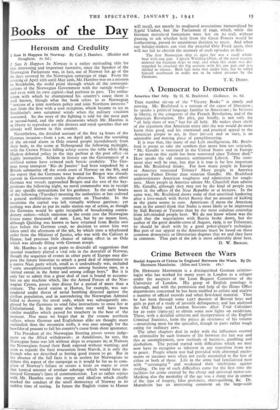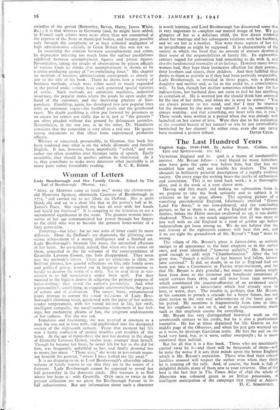Crime Between the Wars
Social Aspects of Crime in England Between the Wars. By Dr Hermann Mannheim. (Allen and Unwin. as.) DR. HERmeusust MANNHEIM is a distinguished German crimino- logist who has worked for many years in London as a refugee under the auspices of the Leon Bequest Committee of the University of London. His grasp of English penology is thorough, and with the permission and help of the Home Office departments concerned he has been enabled to collate and analyse a number of official records and other first-hand material. Thus he has been through some 1,017 dossiers of Borstal boys and girls as part of a study of juvenile delinquency, and has analysed the Old Bailey and London Sessions After Trial Calendars for 20 years (1915-35) to obtain some new lights on recidivism. These, with a detailed criticism and interpretation of the English Criminal Statistics, form the pieces de resistance of his volume —nourishing meat for the specialist, though in parts rather tough eating for ordinary jaws.
The other chapters deal in order with the influences exerted on criminality by such features of life between the last war and this as unemployment, new methods of business, gambling and alcoholism. The period started with difficulties which we may now have to recognise as inherent in any transition from war to peace. People whom war had provided with abnormal excite- ments or incomes were often not easily reconciled to the loss of either or both of these. Life in the army had familiarised men with " scrounging " and weakened their inhibitions against stealing. On top of such difficulties came for the first time the facilities for crime created by the cheap and universal motor-car. Marking also the mentality of the age was a sharp rise in crimes of the type of forgery, false pretences, share-pushing, &c. Dr. Mannheim has an interesting comment on the large-scale swindles of the period (Bottomley, Bevan, Hatry, James White, &c.) ; it is that whereas in Germany (and, he might have added, in France) such crimes were more often than not committed at the expense of the State or municipal bodies, and became possible only through the complicity or at least criminal negligence of high administrative officials, in Great Britain this was not so.
In examining the relation between unemployment and crime, he deprecates inferring too much from the surface parallelisms exhibited between unemployment figures and prison figures. Nevertheless, taking the results of observations by prison officials of various kinds he thinks that unemployment is shown to be a crime-producing agency of " overwhelming force." His chapter on methods of business administration corresponds as closely as any to the title of his book. There he shows how a variety of business methods, which were either novel or much expanded in the period under review, have each generated special varieties of crime. Such methods are automatic machines, industrial insurance, the popular stores where the goods lie open under the hand of the customer, and the increasing practice of hire- purchase. Gambling, again, has developed two new popular lines with an enormous vogue—the football pools and the greyhound races. No doubt gambling is often put forward by prisoners as an excuse for crimes not really due to it, just as " the pictures " are often pleaded without due ground by delinquent juveniles. Nevertheless, in the one case as in the other, Dr. Mannheim considers that the connexion is very often a real one. He quotes strong statements to that effect from experienced probation officers.
Written or conceived, presumably, in German, this book has been rendered into what is on the whole idiomatic and forcible English. It has, however, been imperfectly " vetted," and one rather too often stumbles over German turns of speech. Easily avoidable, they should in another edition be eliminated. As it is, they contribute to make more deterrent what inevitably is in
many parts rather formidable reading. R. C. K. ENSOR.































 Previous page
Previous page